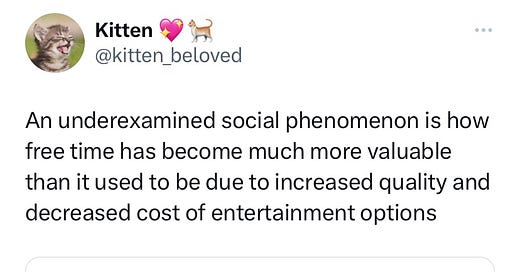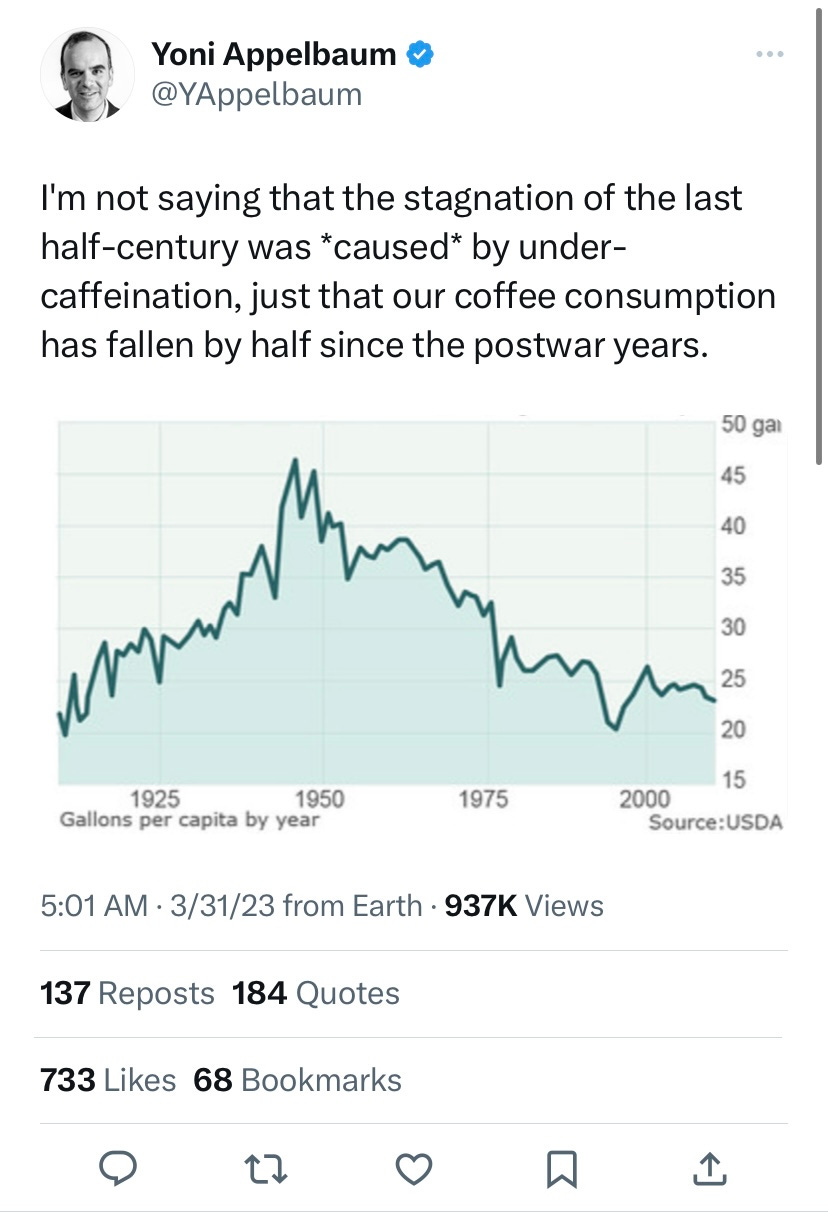I saw this tweet earlier today and it explains most of the breakdown in dating over the last decade, it may also explain some other social externalities of tech progress like the widening split between young men and women’s political orientations:
How it goes
You see an attractive person at Whole Foods, their phone is in hand, their eyes adroitly avoid ogling other people, unlike you, dear reader. And unlike me.
You think to yourself, “I wonder what they’re like?” Or, if you’re a girl, like my fiancé, looking at another girl, you think, “I wonder what it’s like to be them?”
But the idea of just going up with a “Hey, just wanted to say. . .,” is out of the question, at least if you were born after Gen X. Gen Xers and older folks have no such issue, they’re different, you can see it on their faces. You hear it in their voices when they speak.
Boomers and Gen X have a strong agnosticism about the character of other people, and a nontrivial subset of these age groups have a huge amount of optimism about the average person on the street. They assume other people are approachable, and they tend to force the shy, human turtles out of their shells just by being more extroverted themselves.
Younger generations are more suspicious, I’m suspicious. I have reason to be. We’re all competing for each other’s attention and losing the battle at a scale unimaginable to most older people. We’re competing against effulgent streams of infinite media, a never ending flow of breasts and butts and dumb podcast clips following calamities in Maui following videos of rank ordered burgers in New York following more and more and more.
We don’t talk about “ghosting” anymore, likely because it’s the default social assumption among millennials and zoomers. We all know everyone is busy being entertained, that any potential interaction with a peer would mean a fight between us and all of Silicon Valley for their attention. This makes us much less approachable and much less likely to approach.
Our time is more valuable than ever, this undergirds a new social contract.
Things are getting weird because of this new contract. One example of how weird things are getting is a study I read not too long ago about how the rise in teen depression is explained largely by the increasing amount of time parents spend on their phones. (I’ll have to find the study later today or early tomorrow and make a separate post for paid subscribers). Children are losing the battle, too.
Solutions anyone?
A lot of solutions to this problem that I see come straight out of Dune. Well-meaning people want to see a grand abandonment of technology and a return to living in something like early 19th century Appalachia. But that’s hard living, which no one wants to admit. Modern life is wonderful and we shouldn’t just give up on it. It’s beautiful to live at the latest point in history, I don’t want to go back, I want to go forward.
There’s no other option.
It’s all doable
I think the problems we’re facing are all workable, and that the phone problem specifically is not really much different from problems like junk food or smoking. Once you know it’s bad for you it’s a bit easier to regulate behavior. Campaigns to raise awareness about harmful behaviors and substances have seen outsized success over the last few decades. More Americans smoked than the French in the mid 20th century, everyone smoked. You don’t really see folks smoking much anymore.
There’s also been an (less pronounced) effort to cut out caffeine:
Awareness
Consider this the start of an awareness campaign, dear reader. It’s for you as much as it is for me. I need to read more, you need to read more, we need to be reading together. We need to find things to do that aren’t online. We need to spend as much time with others as possible and resist the pull of the breasts and butts and the rank ordered burgers in New York. I think we’ll be happier and more normal.







